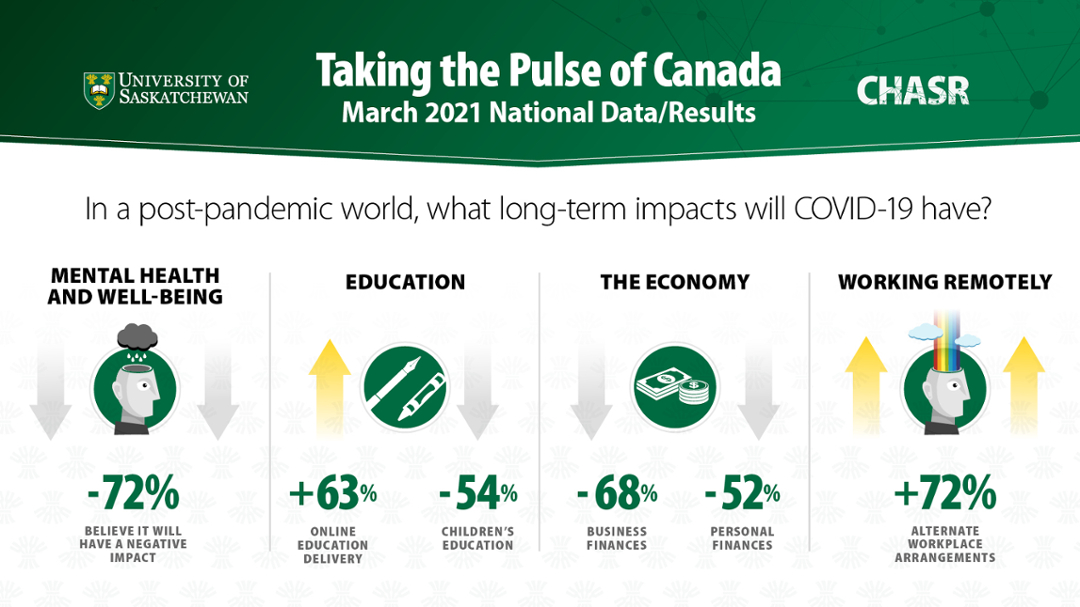
Canadians hopeful for new workplace arrangements, dreading mental health and economic impacts of pandemic: USask research
SASKATOON – Canadians are bullish on a post-pandemic future when it comes to new ways to do their work but are apprehensive about dark days to come for their mental health, the economy, and for their personal finances—these are some of the highlights of the first Taking the Pulse of Canada national survey conducted by the University of Saskatchewan’s Canadian Hub for Applied and Social Research (CHASR).
From March 1 to March 19, 1,002 people across Canada were asked by telephone what long-term impacts they perceived COVID-19 will have across 15 different categories. The results of the survey yield a margin of error or +/- 3.1% nationally (19 times out of 20, meaning the results can be considered reliable 95 per cent of the time).
“With the ramping up of our national vaccination efforts, and light at the end of the tunnel, we thought it interesting and important to look ahead to what a post-pandemic Canada may look like according to Canadians,” said Jason Disano, director of CHASR. “Much of the public opinion research collected since the onset of the pandemic have focused on the immediate or short-term impacts of COVID-19, such as adherence to public health measures and willingness to vaccinate.”
Positive long-term changes from COVID-19 (majority of respondents foresee a positive impact):
- Online shopping (76%)
- Alternate workplace arrangements (72%)
- Online education delivery (63%)
- Willingness to mask in public (61%)
Negative long-term changes from COVID-19 (majority of respondents foresee a negative impact):
- Mental health and well-being (72%)
- The economy (68%)
- International travel (65%)
- Public events (57%)
- Children’s education (54%)
- Personal finances (52%)
The survey also revealed a few key gender differences, with significantly more woman than men forecasting positive impacts to personal relationships, domestic travel, and social gatherings.
Click here for a full summary of the survey.
The survey was conducted in CHASR’s 20-station telephone survey facility, using random digit dialing (RDD) techniques to contact landline and cellphone numbers across Canada, and offered the survey in both official languages.
USask experts available to discuss results:
- On mental health:
- Tamara Hinz, MD, FRCPC, consultant psychiatrist, Division of Child and Adolescent Psychiatry, University of Saskatchewan, Saskatchewan Health Authority
- On educational adjustments:
- Professor Jay Wilson, head, Department of Curriculum Studies and acting head, Department of Educational Foundations and Department of Educational Administration, College of Education, University of Saskatchewan
- On adaptations to work:
- Erica L. Carleton, PhD, assistant professor and Grandey Leadership Scholar, Human Resources and Organizational Behaviour, Edwards School of Business, University of Saskatchewan
-30-
For more information, contact:
Victoria Dinh
USask Media Relations
306-966-5487
victoria.dinh@usask.ca

